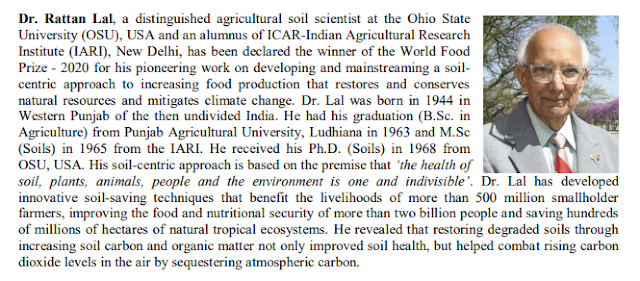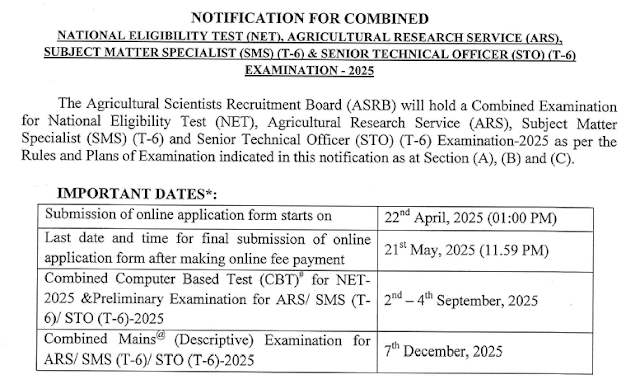The Legacy of Rattan Lal: A Pioneer in Soil Science and Sustainability.
Soil is more than just dirt—it is the foundation of life, agriculture, and environmental stability. Few scientists have contributed as much to the understanding and management of soil as Dr. Rattan Lal, a globally recognized leader in soil science and sustainability. His groundbreaking research has not only transformed agricultural practices but also played a vital role in combating climate change and ensuring global food security.
 |
| "Dr. Rattan Lal, a renowned agricultural soil scientist and ICAR-IARI alumnus, recognized for his contributions to sustainable soil management." |
Born on September 5, 1944, in Karyal, West Punjab (now in Pakistan), Rattan Lal’s journey to becoming one of the world's most influential soil scientists was shaped by his early experiences. Following the Partition of India in 1947, his family relocated to India, where they practiced subsistence farming on semi-arid land. Witnessing firsthand the struggles of farming communities, Lal developed a deep interest in agriculture and soil conservation.
He pursued his Bachelor of Science from Punjab Agricultural University in Ludhiana and later obtained his Master of Science from the Indian Agricultural Research Institute in New Delhi. In 1968, he earned his Ph.D. in soils from The Ohio State University, a pivotal moment that laid the foundation for his distinguished career.
A Distinguished Academic and Research Career
Dr. Lal’s career spans multiple continents and decades, reflecting his dedication to solving global soil and environmental challenges. His professional journey includes positions at:
-
University of Sydney, Australia (1968-1969) – where he began his research in soil processes.
-
International Institute of Tropical Agriculture, Nigeria (1969-1987) – where he conducted pioneering studies on soil degradation and restoration in tropical regions.
-
The Ohio State University, USA (1987-Present) – where he founded and currently directs the Carbon Management and Sequestration Center.
His research has significantly advanced the understanding of soil health, focusing on carbon sequestration, regenerative agriculture, and sustainable soil management. By promoting practices like no-till farming, agroforestry, and organic amendments, he has provided solutions that benefit both the environment and farmers worldwide.
Impact on Global Agriculture and Climate Change
Dr. Lal's work has been instrumental in addressing some of the world's most pressing issues:
-
Climate Change Mitigation – His research on soil carbon sequestration has shown that soils can serve as a powerful tool in reducing greenhouse gas emissions.
-
Food Security – By advocating for improved soil management, he has helped increase agricultural productivity, benefiting over 500 million smallholder farmers.
-
Soil Conservation – His work has contributed to reducing land degradation and promoting sustainable farming methods globally.
Publications and Recognitions
With over 1,000 peer-reviewed journal articles, 550 book chapters, and more than 100 authored or edited books, Dr. Lal’s scholarly contributions are extensive. His impact has been widely recognized with prestigious awards, including:
-
Japan Prize (2019) – for his contributions to soil management and sustainability.
-
World Food Prize (2020) – acknowledging his efforts in enhancing global food security.
-
Padma Shri Award (2021) – one of India's highest civilian honors for his contributions to agriculture and environmental sustainability.
-
Gulbenkian Prize for Humanity (2024) – recognizing his dedication to soil health and climate action.
Notably, Dr. Lal has donated the monetary awards from his prizes to further research and education in soil science, reflecting his commitment to nurturing future generations of scientists.
Final Thoughts
Dr. Rattan Lal’s legacy is a testament to the power of scientific research in shaping a better future. His pioneering work in soil science has provided solutions for some of the most critical environmental challenges of our time, from climate change to sustainable agriculture. As the world continues to grapple with food security and environmental degradation, his contributions will remain invaluable for generations to come.
Further Reading:
For more details on Dr. Rattan Lal’s work and achievements, explore the following sources:
Rattan Lal’s work continues to inspire scientists, policymakers, and farmers alike, proving that the key to a sustainable future lies beneath our feet.


Comments